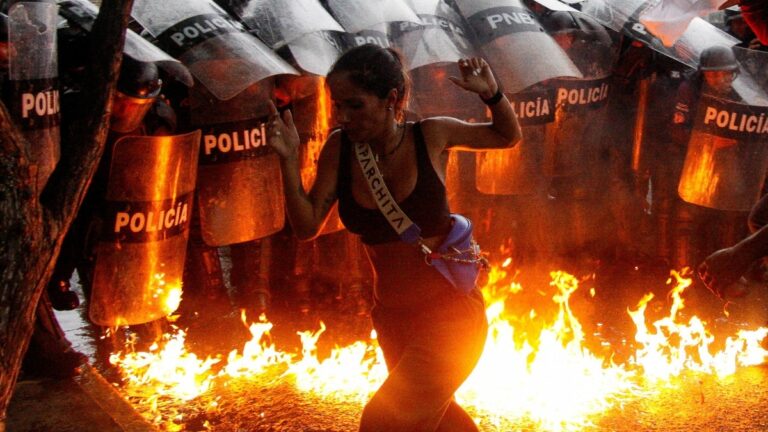Venezuelan security forces clashed with protesters in Caracas on Monday evening following doubts about the results of a presidential election announced the previous day. Amid the unrest, thousands of demonstrators walked from poor areas of the city to converge on the presidential palace to voice their discontent.
President Nicolás Maduro has declared victory in the election and claimed a third term, but opposition leaders have branded the results fraudulent and say their candidate, Edmundo González, won in a landslide victory with 73.2% of the vote, a result that pre-election polls had predicted would see him win.
Amid growing discontent over Venezuela’s ongoing economic crisis, the opposition has rallied behind Gonzalez and is seeking to oust President Maduro. International organizations, including the United Nations, have called on Venezuelan authorities to release detailed voting records from each polling station. Argentina has not recognized Maduro’s victory, and Venezuela has recalled its diplomats from Buenos Aires. Venezuela has also suspended commercial flights between Panama and the Dominican Republic since Wednesday.
In response to the protests, a large number of military and police forces equipped with water cannons were deployed in Caracas. Demonstrators chanted “Freedom, freedom!” and engaged in acts of civil disobedience, such as burning tires and tearing down posters of Maduro. Clashes broke out between demonstrators and security forces, including armed police and pro-government paramilitary forces.
Many Venezuelans, including residents of the La Lucha neighborhood, expressed dissatisfaction with the electoral process. Protester Paola Zarzalejo criticized the election as fraudulent and expressed concern for the future of Venezuela’s young people, a sentiment echoed by her father, Miguel Zarzalejo, who lamented the country’s economic decline and potential brain drain.
Another protester, Cristobal Martinez, described the election as “rigged” and highlighted the dire situation facing Venezuelan youth, including high unemployment and lack of educational opportunities.
President Maduro has accused the opposition of plotting a coup by contesting the election results. Venezuela’s Attorney General Tarek Saab has warned that any illegal activity during the protests will face severe legal penalties, and reported that 32 people have been detained for various offences related to the unrest.
Venezuelan President Nicolás Maduro is a member of the United Socialist Party of Venezuela, a left-to-far-left socialist party that has ruled the country since 2007. The party was formed through the merger of various political and social groups that supported the Bolivarian Revolution started by President Hugo Chavez.
US officials have expressed concern about the election results, saying available data suggests there appear to be discrepancies between the announced results and the actual vote count. The Organization of American States (OAS) is scheduled to meet on Wednesday to discuss the situation.
Further complicating the debate, the National Electoral Commission (CNE) reported that vote tallying was delayed due to an alleged “attack” on the election data transmission system. CNE president Elvis Amoroso said 80% of the votes had been counted, putting turnout at 59%.
Although the CNE claims to be independent, the opposition alleges it functions as an extension of the government. Opposition observers were barred from polling stations and reports emerged that the opposition held copies of approximately 40 percent of the voting records.
Machado had earlier stressed that Venezuelans had expressed a desire for change and called on the military to respect the true results of the elections.
The electoral atmosphere was further strained by sporadic violent incidents, with the Venezuelan Observatory for Social Conflicts reporting that armed groups loyal to the ruling party had intimidated voters in several states and in Caracas, leaving at least one person dead.
As the election dispute continues, Venezuela’s opposition voters have staged dramatic and emotional demonstrations, taking to the streets, getting on their knees and praying for divine intervention, chanting “God help us”.
Tesla founder Elon Musk also took to social media to call Maduro a dictator and call for change.
Venezuela remains divided in the wake of a disputed election, with supporters of both sides awaiting the final results amid growing calls for peace and transparency.

